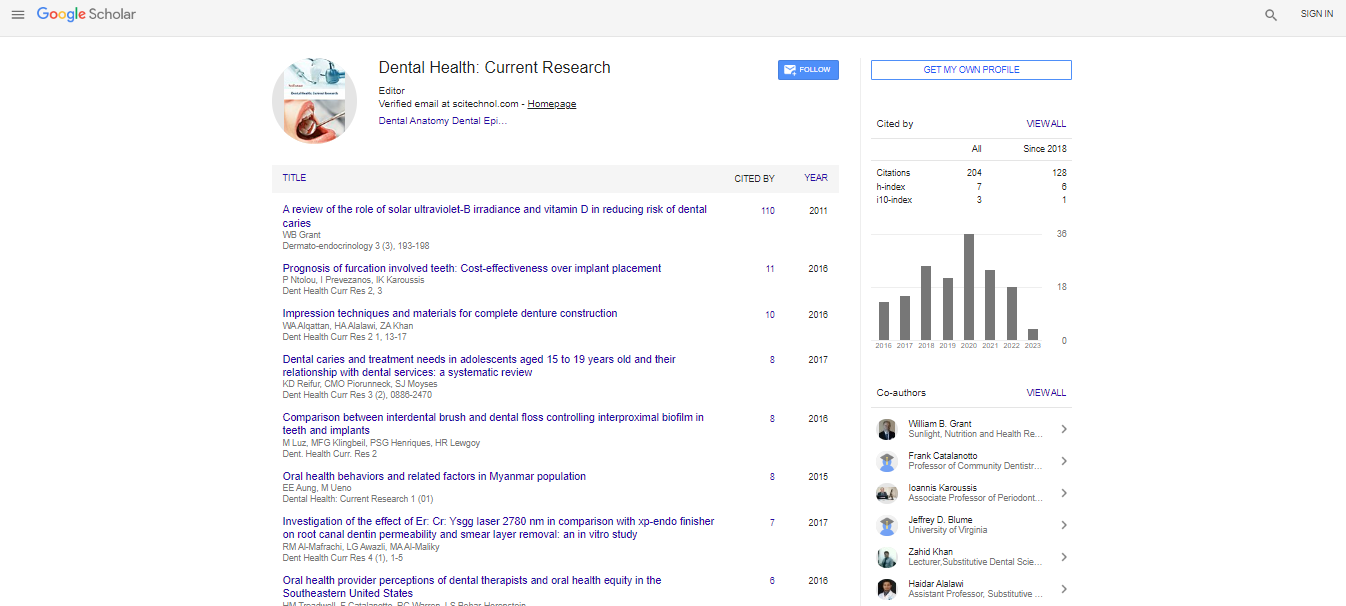Perspective, Dent Health Curr Vol: 9 Issue: 1
Dental Hygienists in Advancing Oral Health through Education
Hubban chun*
Dental Biomaterial Department, Universitas Gadjah Mada, Yogyakarta, Indonesia
*Corresponding Author: Hubban chun
Dental Biomaterial Department,
Universitas Gadjah Mada, Yogyakarta, Indonesia
E-mail: chubban@ugm.ac.id
Received date: 22 January, 2023, Manuscript No. dhcr-23-91845;
Editor assigned date: 24 January, 2023, Pre QC. dhcr-23-91845(PQ);
Reviewed date: 14 February, 2023, QC No. dhcr-23-91845;
Revised date: 21 February, 2023, Manuscript No. dhcr-23-91845(R);
Published date: 28 February, 2023, DOI: 10.4172/2470-0886.1000140.
Citation: Chun H (2023) Dental Hygienists in Advancing Oral Health through Education Dent Healt.h Curr 9:1.
Description
Dental hygiene is the practice of promoting and maintaining oral health. It involves a range of preventive and therapeutic measures that are designed to keep teeth, gums, and other parts of the mouth healthy and free from disease. The primary focus of dental hygiene is on preventing dental caries (cavities) and periodontal (gum) disease, as well as detecting and treating oral conditions at an early stage.
Dental hygienists play a critical role in advancing oral health through patient education. They are highly trained professionals who work alongside dentists to provide preventative and therapeutic dental care to patients. The education and counseling provided by dental hygienists can have a significant impact on the oral health of patients.
Advancing education in dental hygiene can have numerous benefits for both individual dental hygienists and the broader field of dentistry. Here are some ways in which education can be advanced in this area.
Advanced degrees
Dental hygienists can pursue advanced degrees such as a master's or a doctoral degree in dental hygiene or related fields. These programs offer a more in-depth exploration of the science behind dental hygiene and provide dental hygienists with the knowledge and skills needed to advance their careers.
Continuing education: Dental hygienists can participate in continuing education courses and workshops to stay up-to-date with the latest developments in dental hygiene. This is particularly important given the constantly evolving nature of the field.
Specializations: Dental hygienists can also pursue specialized training in areas such as periodontics or pediatric dentistry. This allows them to offer more specialized services to their patients and become experts in a particular area of dental hygiene.
Research: Dental hygienists can also contribute to advancing education in the field by conducting research and publishing their findings. This can help to identify new best practices and treatments for dental hygiene and lead to improvements in patient care.
Patient assessment: Assessing a patient's oral health status, including identifying any risk factors for dental caries or periodontal disease.
Oral prophylaxis: Cleaning and scaling teeth to remove plaque, tartar, and other debris.
Patient education: Providing patients with education and advice on oral hygiene practices, such as brushing, flossing, and dietary habits.
Oral cancer screening: Checking for signs of oral cancer, including examining the tongue, throat, and other parts of the mouth.
Preventive treatment: Applying fluoride or sealants to teeth to help prevent dental caries.
Periodontal therapy: Treating periodontal disease through scaling and root planing, antibiotic therapy, or other procedures.
Oral health education: Dental hygienists are responsible for educating patients on the importance of maintaining good oral hygiene practices. They provide patients with information on brushing and flossing techniques, how to prevent tooth decay and gum disease, and the importance of a healthy diet.
Disease prevention: Dental hygienists also play a crucial role in preventing oral diseases. They educate patients on the risk factors associated with dental diseases such as tobacco use and poor nutrition. They also provide patients with information on how to prevent oral cancer, periodontal disease, and tooth decay.
Treatment recommendations: Dental hygienists may recommend certain treatments to patients based on their individual needs. They may suggest fluoride treatments to help prevent tooth decay, sealants to protect teeth from cavities, or custom mouth guards to prevent sports-related injuries.
Follow-up care: Dental hygienists may also follow up with patients to ensure they are maintaining good oral hygiene practices and to monitor the progress of any treatment recommended.
Conclusion
Advancing education in dental hygiene is crucial for improving patient care and promoting the growth and development of the field. By pursuing advanced degrees, continuing education, specializations, and research opportunities, dental hygienists can play a key role in advancing the field of dental hygiene. Dental hygienists work alongside dentists and other oral health professionals to provide comprehensive care for patients. They are licensed healthcare professionals who have completed an accredited dental hygiene program and passed a national board exam.
 Spanish
Spanish  Chinese
Chinese  Russian
Russian  German
German  French
French  Japanese
Japanese  Portuguese
Portuguese  Hindi
Hindi 